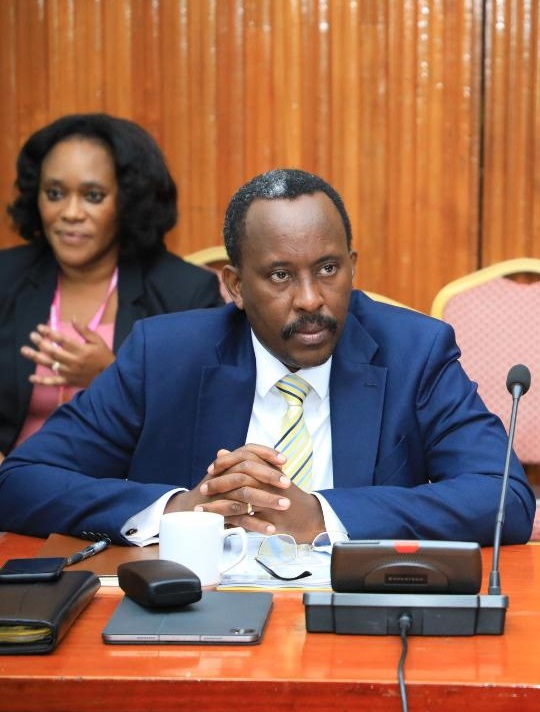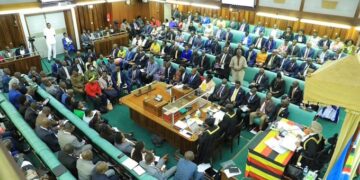
The Commissioner General of Uganda Revenue Authority, John Musinguzi, has defended the Electronic Fiscal Receiving and Invoicing Solution (EFRIS) as an efficient administration system that will double tax collection.
“Hon members EFRIS is not a new tax, it’s a system that helps us to fairly asses the tax of VAT and collect it efficiently’’.Mr Musinguzi explained.
This as the joint parliamentary committees of Trade and Finance met with the Ministry of Trade and Finance officials led by Matia Kasaijja, Gen Wilson Mbadi, and the Uganda Revenue Authority Commissioner General John Musinguzi together with the business community represented by members of the Kampala City Traders Associations.
According to Mr.Musinguzi, several African countries, including neighboring countries like Rwanda and Tanzania, have been using the EFRIS system for the past decade to levy Value Added Tax (VAT). The system has been successful because it doesn’t negatively impact businesses but rather promotes transparency, thereby creating a level playing field.
Traders in Kampala have shut their shops in protest against the implementation of the EFRIS system since Monday.
He noted that the system offers numerous benefits for all parties involved, such as using it as a sales solution for those who don’t have one, accurately recording sales and stock, tracking tax payments on transactions, and providing protection against stock theft.
It also helps taxpayers determine their VAT status and facilitates the refund process, which is a major concern.
He denied the accusations that the security personnel physically mistreat the traders when URA tax collectors are doing their work.
“The only complaint is about penalties, yes the penalty is harsh but it’s in the law, it is, not the discretion of the commissioner general or the taxing collecting officers, It clearly stipulated in TPC section 73 that anybody who does not issue an electronic invoice and receipt and is on VAT register must pay a fine of 400 currency points of the value of taxes being invaded ”. Musinguzi said.
According to his statement, he mentioned that it is common for receipts to not have the value of 400 currency points. As a result, individuals end up receiving the equivalent of 400 currency points, which is equal to 6 million shillings. He also stated that some individuals who oppose the EFIRIS system are those who are under-declaring their sales.
“Hon. chair and members, without mentioning names,’’ I would like to confirm, that for some taxpayers whom we have successfully rolled out EFIRIS with a lot of resistance, we have been shocked to establish the level of sales declarations”. Commissioner General added.
He noted some businesses it as low as 10%, noting someone makes a sale of 10 million a day and declares 1M shillings, wondering how the country can be developed when people are determined to be non-compliant across all sectors.
Advocating for the suspension of EFRIS is going against world order. By not adopting technology that can make life easy for traders and the government, it is staying backward and not leveling the playing field. He said.
The Uganda Revenue Authority began adopting and implementing electronic fiscal receipting and invoicing solutions in 2019. However, the process was hampered by the COVID-19 pandemic in 2020, which prevented URA from approaching large businesses to start the integration. As a result, the integration process was halted for the entire year of 2020. Musingizi explained this setback.
According to Musinguzi, EFRIS is not limited to Uganda, but rather a solution for the world. Several African countries have already adopted EFRIS.
The Shadow Minister for Trade also Jinja city woman MP Manjeri Kyebakutika has called for immediate suspension of the Electronic Fiscal Receipting and Invoicing Solution- EFRIS that has recently resulted in demonstrations by the business community across the country.
The MPs say that the traders allege that they have no crew about the systems of EFRIS which is leading to the collapse of their businesses.
She noted that the business community should be sensitized about the system to appreciate it before enforcement.
Referring to the huge public debt that has affected the national resource envelope, Paul Omara member of the finance committee of parliament said Uganda can only finance its budget by 50%-58% due to a huge challenge of raising sufficient domestic revenues to fund the national priorities.
He re-echoed the need to widen the tax base to ensure that every Ugandan pays their fair share of tax which will subsequently reduce the tax burden on a few compliant Ugandans.














